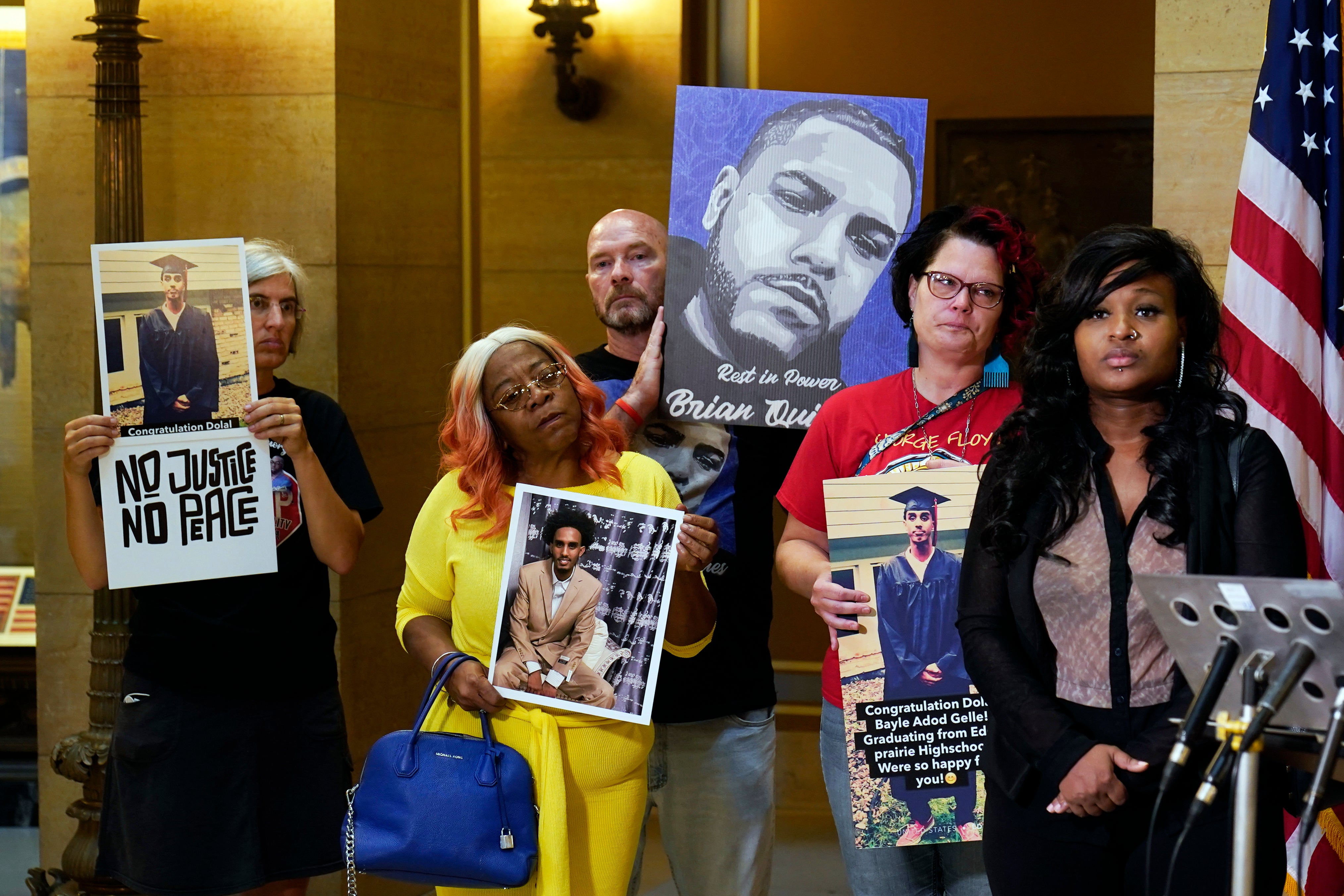Minnesota lawmakers pass modest police accountability bill
The Minnesota Senate has jointed the state House in approving a modest set of police accountability measures as part of a broader public safety budget bill

Your support helps us to tell the story
From reproductive rights to climate change to Big Tech, The Independent is on the ground when the story is developing. Whether it's investigating the financials of Elon Musk's pro-Trump PAC or producing our latest documentary, 'The A Word', which shines a light on the American women fighting for reproductive rights, we know how important it is to parse out the facts from the messaging.
At such a critical moment in US history, we need reporters on the ground. Your donation allows us to keep sending journalists to speak to both sides of the story.
The Independent is trusted by Americans across the entire political spectrum. And unlike many other quality news outlets, we choose not to lock Americans out of our reporting and analysis with paywalls. We believe quality journalism should be available to everyone, paid for by those who can afford it.
Your support makes all the difference.The Minnesota Senate approved a modest set of police accountability measures early Wednesday that's part of a broader public safety budget bill, as the state's divided Legislature put itself on pace to avert a partial state government shutdown.
The Senate's 45-21 vote followed a 75-59 vote in the Minnesota House on Tuesday night, and it came on the heels of last week's sentencing of former Minneapolis police Officer Derek Chauvin to 22 1/2 years for murder in the death of George Floyd. The bill attracted Republican support in both chambers, while some Democrats who said it didn't go far enough voted no. It now goes to Democratic Gov. Tim Walz for his signature.
The bill contains limits on no-knock warrants and on the use of informants. It was amended on the floor to allow “sign-and-release” warrants so that police aren't required to arrest low-level offenders just because they had missed a court appearance. But Democrats who control the House dropped their push for a ban on “pretextual” traffic stops for minor offenses such as expired license tabs.
The approval follows on a police accountability package passed last summer that included a statewide ban on the use of chokeholds.
Democratic Rep. Carlos Mariani, of St. Paul, chairman of the House public safety committee and one of the top negotiators on the bill, agreed it didn't go far enough but urged lawmakers to approve it anyway and to keep pushing for deeper change. He blamed the Senate GOP majority for blocking stronger action.
“This is a mighty bill,” Mariani said. “And yet as meaningful as all these provisions and more are, it also lacks, in my opinion, the necessary weight of accountability to respond to the persistent use of deadly force by licensed police officers that have produced a steady stream of killings of Black and brown people in Minnesota.”
Senate Republicans resisted stronger measures for months, saying they couldn't support anything they regarded as anti-police. They put a higher priority on passing a $52 billion, two-year state government budget to replace the current budget, which runs out Wednesday night. Walz had signed eight of the big budget bills by Tuesday, but the public safety package was one of a few still needing approval ahead of the looming deadline.
The top Senate GOP negotiator, Warren Limmer, of Maple Grove, who chairs the judiciary committee, said during his chamber’s debate that Republicans weren’t willing to go further and that Democrats will just have to try again next year.
“We are a divided government.” Limmer said. “And we come to some of these issues with various degrees of opposition. It’s been a rather difficult process to arrive at a common point. I believe we have, as far as we could go. And some of the issues that the House wants will have to be continue to be discussed.”
Lawmakers planned to reconvene later Wednesday to pass two remaining budget bills and complete its special session.
Walz imposed some changes via executive order on Monday, including $15 million for violence prevention programs and allowing families of people killed by officers from state law enforcement agencies such as the State Patrol to view the body camera video within five days.
More than a dozen protesters gathered in the Capitol rotunda ahead of the debate to urge the House to reject the compromise and pass tougher measures. They included Courteney Ross, who was Floyd's girlfriend and testified in Chauvin's trial.
“We want the House to reject it and try again,” said protest organizer Toshira Garraway, founder of Families Supporting Families Against Police Violence. “We are in a state of emergency. This isn't a situation where we can wait another year so more people can end up dead.”
Garraway's fiancé, Justin Teigen, a Black man, was found dead in a recycling bin after fleeing from St. Paul police in 2009, in circumstances that remain in dispute. She said in an interview that activists' priorities for additions included lifting the statute of limitations for wrongful death lawsuits against police and mandating that families of people killed in confrontations with police get to see body camera video within 24 to 48 hours. She warned that another police killing could lead to the kind of unrest and destruction that erupted after Floyd's death.
“We need to understand that if police don't start being held accountable for their actions, and the hurt and the harm that they've committed against the community, if the state doesn't start holding these officers accountable, it's going to get bad for everybody because people can only take so much pain," Garraway said.